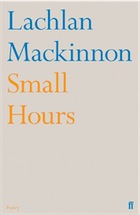reviewed by Phil Brown
When everything is lonely, I can be my own best friend
I get a coffee and the paper, have my own conversations
with the sidewalk and the pigeons and my window reflection…
(Bright Eyes, ‘Lua’)
What do the ‘small hours’ mean to you? Are they a time for honesty? A time when you stop pretending to be yourself? A time for reflection and introspection, when conversation becomes a discussion of great truths and sacred secrets? A time when our thoughts turn towards the times we seldom let ourselves remember? Where your txt messages spring straight from the id and your Googling becomes instinctive and erratic?
These are the small hours that form the genius loci for Lachlan Mackinnon’s latest collection. The poems of Small Hours are the product of a great poet left alone with his thoughts of the people he has known and the people he has been:
She was brilliant. I was highly able. I understood this without ever being told or hearing it. Such were the terms in which we judged one another in our first competitive sizing’s-up of those with whom we would live then there."
The collection opens with a poem called 'Pigeon' that sets the mood perfectly for the crepuscular honesty and meditation on mortality that give Mackinnon’s melancholic reminiscences such a beguiling appeal:
"The pigeon’s world is no better than it believes
but I have sometimes known acts of kindness make me weep
for shame.
Most nights, most people are not afraid to sleep."
Contrast this emotional nudity to the beautiful depiction of the reservation we feel in polite company from Mackinnon’s poem, ‘In Memory of Keith Darvill’:
Oh, the silences
men keep between them
when what they’re keeping back
is what would spoil in being said.
This stanza is truly the crux of the collection – Mackinnon delicately and tentatively delivers us a perfectly preserved verbalisation of ‘what would spoil in being said.’
Mackinnon delicately and tentatively delivers us a perfectly preserved verbalisation of ‘what would spoil in being said.
Much of Small Hours takes the form of self-portraiture as the poet as lone, contemplative figure. In the touching and faintly sardonic ‘Strewth’, Mackinnon describes the act of singing in the shower as representing ‘the freest and the best of us’. This idea is iconic of Mackinnon’s later work – stripped-down, vulnerable lyricism with nothing sullied, nothing masked, just the beauty and terror of the human condition.
The lion’s share of the collection is comprised of the 54-section prose-poem sequence, ‘Book of Emma’, an oblique eulogy, thirty years in the making for an old casual acquaintance. The beauty of this long sequence is that the ‘Emma’ figure is not a point of meditation, but rather a motif to thread through Mackinnon’s concise memoirs.
The poet shifts from lamentation:
Whom the gods love die young.
Emma was talked about as someone of extraordinary gifts ...
to unreliable narration:
Your girlhood is invisible to me. I find myself rereading your father’s obituary. He died this year at eighty-three. His life is online.
But it is at his moments of tangential distraction that Mackinnon gives us his most heartfelt, beautifully indirect thoughts on the loss of a friend:
The size of an Internet footprint means nothing about the value of a life. The operating system I use is Windows XP Service Pack 2. It has a shelf-life. At some point support will be withdrawn. Microsoft euthanase their older products.
As a teacher I would usually ask classes how many of them had suffered illnesses or accidents that would have killed them a hundred years ago. We often disposed of half the room. Always of me. I have been lent time.
The idea of ‘lent time’ goes hand in hand with Mackinnon’s backdrop of ‘small hours’. I am reminded of Yeats’ ‘All Souls’ Night’ in which the poet calls upon the ghosts of fallen friends in a chilling act of platonic incantation. This section from Yeats’ poem would have served as an excellent epigraph to Small Hours:
Wound in mind’s pondering
As mummies in the mummy-cloth are wound;
Because I have a marvellous thing to say,
A certain marvellous thing
None but the living mock
In Small Hours, Mackinnon does have a marvellous thing to say. ‘Wound in mind’s pondering’, he presents us with a profoundly personal yet accessible presentation of his ghosts that will have you rereading this collection for years. Far surpassing any of his previous collections, I will be surprised if Small Hours does not spend this year ubiquitously shortlisted.

Dr F sez: I have always been somewhat wary of young Mackinnon as, when we attended Oxford together (I was going through a phase) he refused to assist me in grave-robbing for a scientific experiment I was working on. I am further offended that none of our correspondences on the ethics of using bat-blood in alchemy have made it into his increasingly autobiographical writing.
Accomplished, his poetry certainly is, but I am truly offended that I am not mentioned once in the entire collection. I shall not forget this Mackinnon, you mark my words. If you wake up one morning to find yourself transformed into a pig with a fishtail, do not say that you were not warned.










